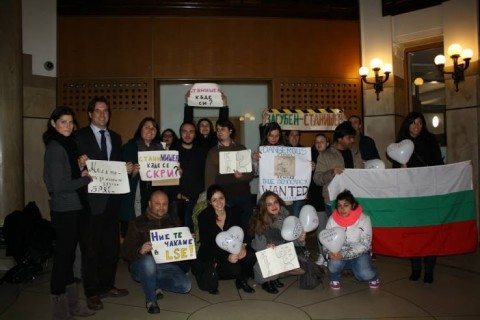
.
To the attention of: Professor N. Piers Ludlow
Professor Odd Arne Westad
.
Dear Prof. Ludlow,
Dear Prof. Westad,
.
On behalf of DANSwithme London, an informal group of Bulgarian citizens living in London, supporting by different activities the anti-government protest movement in Bulgaria, allow us to express our concerns on having Sergei Stanishev give a lecture on the topic of EU Enlargement at the LSE.
We understand now that the lecture has been postponed. Our concerns and the probability of another invitation, however, remain. As you are probably aware, thousands of Bulgarian citizens in Bulgaria and abroad have taken to the streets since 14th June 2013, calling for the resignation of the current government, demanding democracy, accountability, and respect for the rule of law. The current minority government has been formed as a result of last May’s early elections and comprises un uneasy coalition between the Bulgarian Socialist Party (BSP, coming second in the elections with 26,6%), chaired by Dr. Stanishev, and the Movement of Rights and Freedom (MRF, with 11% of the votes) with the tacit support of the anti-European and xenophobic party ATAKA.
After a tumultuous early spring, the highly controversial appointment of Mr. Delyan Peevski, a media mogul with unexplained wealth and questionable connections to Bulgaria’s oligarchy, cast a bona fide „political earthquake” (Ivan Krastev, the Guardian, 30.07.2013). This particular appointment was hastily withdrawn in the wake of unprecedented public outrage, yet it failed to prevent the widespread protests against the coalition government, which have been going on for more than 160 days now. In their peak, the demonstrations attracted 15,000 – 20,000 people.
On the 23rd of October, students occupied the Sofia University as a sign of protest against the government, later on joined by their peers from other universities across the country, supported by more than 600 university lecturers. The intense demonstrations are in line with the general public opinion – the students’ actions have the support of around 60% of the citizens, while more than 70% demand early elections (according public opinion survey by Alpha Research Agency). According to Gallup, 49% of the population support the protests against the government.
Disregarding this, the government has on multiple occasions declared it will not resign and Mr. Stanishev has firmly supported the Prime Minister in this. Furthermore, it has on a number of occasions used disproportionate and excessive police force against peaceful protesters. On the contrary, a leak of the BSP party communication shows that its members are being instructed to discredit and undermine the protesters when talking to the media by no less than the Ministry of the Interior. This has a very sound resemblance to the repressive apparatus of the former communist party structures. The proof of this has been demonstrated last Saturday (16 November) when Sergei Stanishev, the Prime Minister Plamen Oresharski and the leader of MRF allegedly sponsored thousands of demonstrators to come in Sofia in support of the government. Allow us to briefly explain the role of Dr. Stanishev and his party in the described situation, and to illustrate the instances of downright assault on basic democratic procedures and conventions (including the founding principles of the EU) since the beginning of the protests. We believe it to be of utmost importance that the country’s various international partners and supporters are informed of Dr. Stanishev’s disgraceful performance as both a national political leader and chair and representative of the ethos of the European Socialist Party.
Since the first days of this parliament it became obvious that the quorum necessary for the functioning of the Parliament depends on the participation of ATAKA, silently accepted by both BSP and DPS. The questionable appointments of former communist state security agents, controversial figures with alleged shady pasts and connections continued. The protesters, expressing their legitimate concerns against corruption and failure of the government to uphold democracy, were subject to accusations, name-calling and negative campaigns by a number of politicians of the ruling coalition and the pro-Delyan Peevski media group. Furthermore, there were instances of police violence outbreaks reaching up to the recent repressions and arrests, massive identity checks, police surveillance on protesters and even threats by the Prime Minister to state servants of losing their jobs if they take part in the protests against the government. The Ministry of Interior is also over-stepping its authority violating the autonomy of the universities, unlawfully detaining students and deploying disproportionate police force against the peaceful protests. The Ministry of Interior also has recently reinforced the barricade around the parliament to deter the protesters and deployed excessive police force to the demonstrations, while failing to act on outbreaks of violence against foreigners and refugees. The ruling coalition also failed to condemn and contain the ever-growing hate speech and xenophobia incidents and the marching of so-called “civil patrols” comprised of members of nationalistic parties in the centre of the capital. In addition, a recent proposal for amendments in the Ministry of Interior Act restricts the rights of freedom of association and gives full authority to the Ministry of Interior to ban any form of protests if deemed appropriate.
The government has failed to provide adequate shelter to asylum seekers from Syria, hosting them in inhumane conditions. This has already been condemned by Amnesty International. In addition, on the same grounds, the Bulgarian Helsinki Committee called for the resignation of the government.
The minority coalition also plans to partially lift the ban on smoking. Majority of BSP MPs, together with ATAKA and the previous ruling party GERB (Citizens for European Development of Bulgaria) passed a bill banning the sale of agricultural land to EU citizens in contradiction with the Constitution and the Accession Treaty.
The country, being considered the poorest member of the EU, struggling with corruption and problematic transition is haunted by political instability further aggravating the social and economic situation.
Should the government and the ruling coalition have taken their political responsibility at the outbreak of the protests, this record of faux pas would have been mitigated. Dr. Sergei Stanishev, as a Chairman of the ruling party BSP, is personally accountable for this situation, as he categorically denounced the protests and failed to take over the political responsibility. Instead, the lack of honest understanding of the demands of the protesters and the lack of responsiveness sabotaged any possibility for dialogue. The only way out of this stalemate is the resignation of the current government and early elections (Even some BSP members already acknowledge that). What is even more important is that supporters of the whole political spectrum demand resignation of the present government.
Given this background, we would like to kindly ask you to reconsider inviting Dr. Sergei Stanishev to the LSE again. We think that the future of EU enlargement lies in bringing EU closer to its citizens, bridging the gap of democratic deficiency and endorsing the EU role as a democracy anchor for the post-communist states especially in the Western Balkans. Given the above-mentioned, we do not see what lessons for the future of the EU Dr. Stanishev can share. We understand that everyone has the right to freedom of speech and to express their views publicly, but we cannot help but wonder what future holds for the EU if it is represented by an individual for whom staying in power is more important than listening to the voice of his people.
Sincerely,
DANSwithme LONDON
Desislava Hristova
Sonya Merkova
Mihaela Zhivkova
Stanislava Kunovska
Boris Andreev
Jordan Chichikov
Tanya Simeonova
Ivaylo Minov
Nadya Mladenova
Peter Bachev
Neda Genova
Radostina Alexandrova
Elena Bojinova
Ivanka Genova
Nikolay Nikolov
Borislav Gizdavkov
Alexander Panayotov
Nikola Penev
Lyubomir Velichkov
Georgi Lesov
Zhivko Dimitrov
Tatyana Mircheva
Asya Draganova
Yoana Dimitrova
Petya Zhivkova
Stefan Dimov



